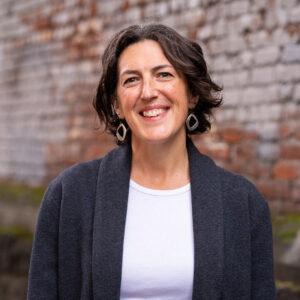
Senior Communications Director
Journalist Ashley Ahearn (left) on the level with a fellow horsewoman during a recent interview. Photo by Megan Farmer
Voices rising from communities on the frontlines of climate change carry the evidence and emotion to call others to action. But what happens if no one is there to make those voices heard?
Today, 73 percent of all internet publishing jobs are concentrated in coastal cities, resulting in fewer journalists personally connected to rural communities. In many of these communities, industries like ranching and forestry are key to economic survival, and are being directly impacted by the effects of climate change. These are some of the most complex and important issues of our time — issues that are central to the work of Ecotrust — and rural voices are being given short shrift in coverage of those issues.
In 2019, Ecotrust has the opportunity to disrupt this trend with the Rural Reporting Fellowship, a year of committed economic support to enable reporting on rural communities by journalists who truly are of those communities. The Methow Valley News of the north central Washington Cascades is the recipient of this year’s fellowship.
Climate change, and how it intersects with the complex mix of ranching, recreation, public lands management, and shifting demographics in the Methow Valley, will be the focus of the reporting from this year’s fellowship. Led by Pacific Northwest news veteran Don Nelson, the Methow Valley News is enriched by the reporting of award-winning journalist Ashley Ahearn, whose science and environmental reporting experience and ability to connect global forces to grounded experiences, are already on display in this week’s prelude piece “What does climate change mean for you?”.
The Rural Reporting Fellowship comes with “no strings attached” to the editorial content of the Methow Valley News or Ashley’s storytelling. The stories that the fellowship supports will be determined by the paper and based on its identification of complex issues that have deep local resonance and lessons for us all.
June 5 | A walk in the forest
A wildfire scientist assesses the effects of the Crescent burn.
May 22 | Sagebrush under siege
Invasive, fast-burning cheatgrass is pushing out native plants, leading to higher intensity fires while managers struggle to keep pace.
May 8 | Fire, drought, and high anxiety
As wildfires become more frequent and intense, the disappearance of snow now ushers in a season of higher anxiety for those who have experienced the destruction of wildfire.
April 17 | Learning to ask for help
As we all look ahead to dryer times (there’s a drought alert for this coming season in the Okanogan and Methow basins), what can be learned from farmers on the other side of the world, dealing with similar challenges?
March 27 | A letter from the Australian Hill Country
Methow Valley News reporter Ashley Ahearn travels to Australia as part of a year-long project on the effects of climate change on life in the Methow Valley and the West.
January 3 | What does climate change mean for you?
Methow Valley News explore local impacts of global climate change
January 1 | A promising partnership
Don Nelson on the meaning of the fellowship for the Methow Valley News and the promise of a year of impactful reporting ahead.

Blog
Rural Reporting Fellow Bethany Goodrich shares how community care, reciprocity, and centering Indigenous voices guide her storytelling.